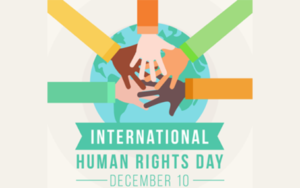On Human Rights Day (December 10), ANDY HAMILTON SJ writes that companionship and advocacy work hand in hand to support vulnerable people and to provide them with a voice to defend their rights.
When we think of human rights, we often think first of our own rights. We think of such things as our right to challenge a parking fine, to walk through public land and to call a lawyer if we are arrested. Rights are primarily things that concern us, our own rights.

Image credit: uclg.org
It may be more helpful, however, to look at our own rights through the lens of the rights that strangers have. That helps us see that rights have to do with our relationships with one another in a community. If I have a right, others in my community have a responsibility to respect it. If a stranger has a right to food and water, we may have a responsibility to provide it. Rights are not just about us; they are about the communities that we form with others, about the respect we give to others and receive from others. They are based in the recognition that our health and happiness depend on others and not simply on ourselves.
Rights are not separate, not unrelated things. They list some of the things that we all need to live full human lives. These things include food and drink, shelter, safety, medical care, education, work, license to associate with other people, to promote political and religious beliefs, to be free from discrimination and abuse. Of course, these rights do not stand alone. They need to be seen in relationship to one another. The right to express our political views, for example, may come into conflict with the right of the community to security and to be free from abuse. In Australia, too, politicians are working to resolve potential conflict between the right to religious freedom and to be free from discrimination.
Many of our rights will ordinarily be guaranteed through our work or our families. Children are kept safe, sheltered, fed and receive their earliest education in their families. Parents work in order to guarantee these rights. Many people, however, have no contact with families, suffer from mental and physical illness and are unable to work. It is the responsibility of the community to provide for people who otherwise would not enjoy these rights. In developed societies governments provide the network of law, infrastructure and regulation that enable people to better themselves and also to provide support for people who could not live decently.
Governments, however, are always under pressure to neglect the rights of people who are vulnerable. That is why Jesuit Social Services and other community organisations who work with vulnerable people must help provide them with a voice to defend their rights. Companionship and advocacy go together.


